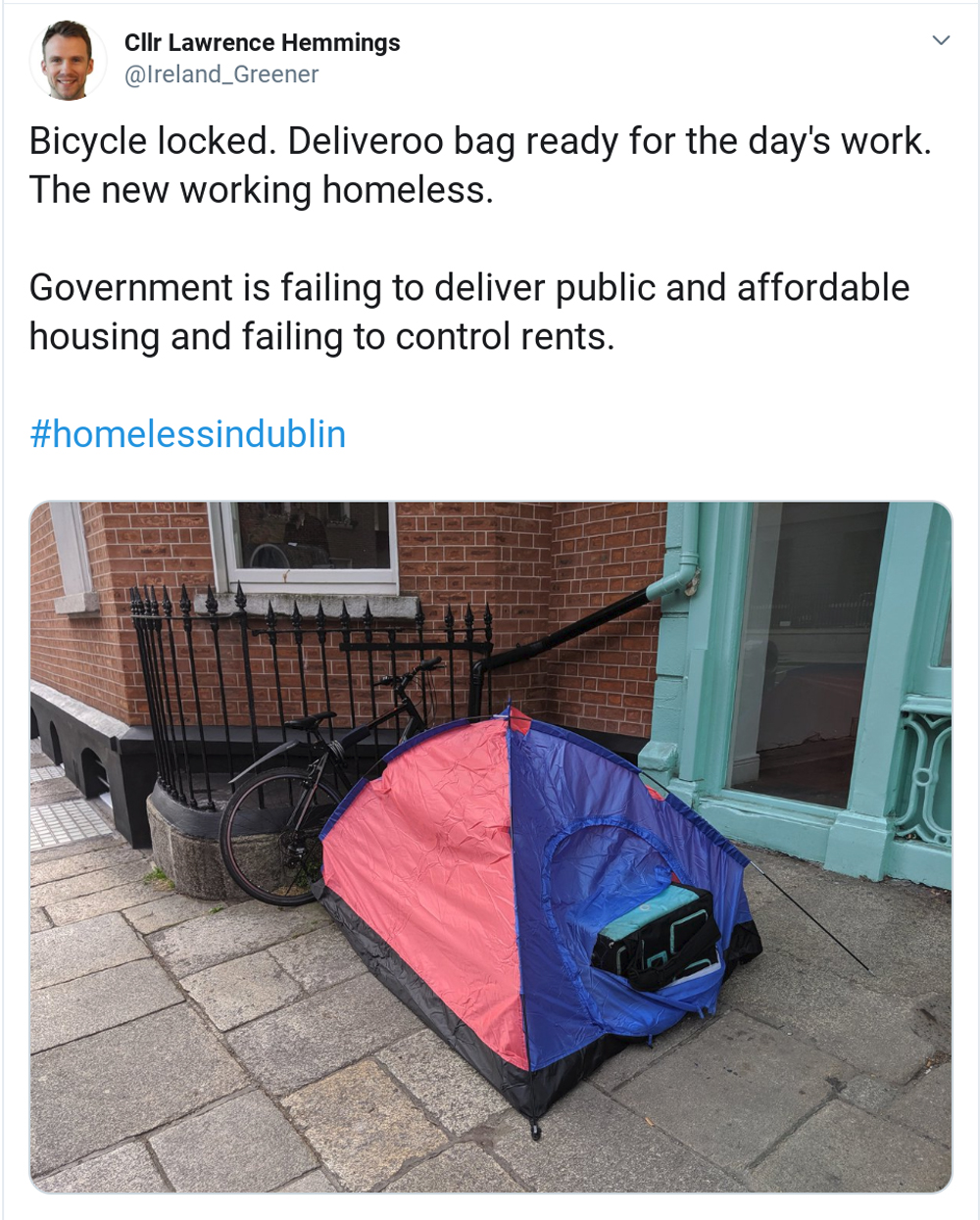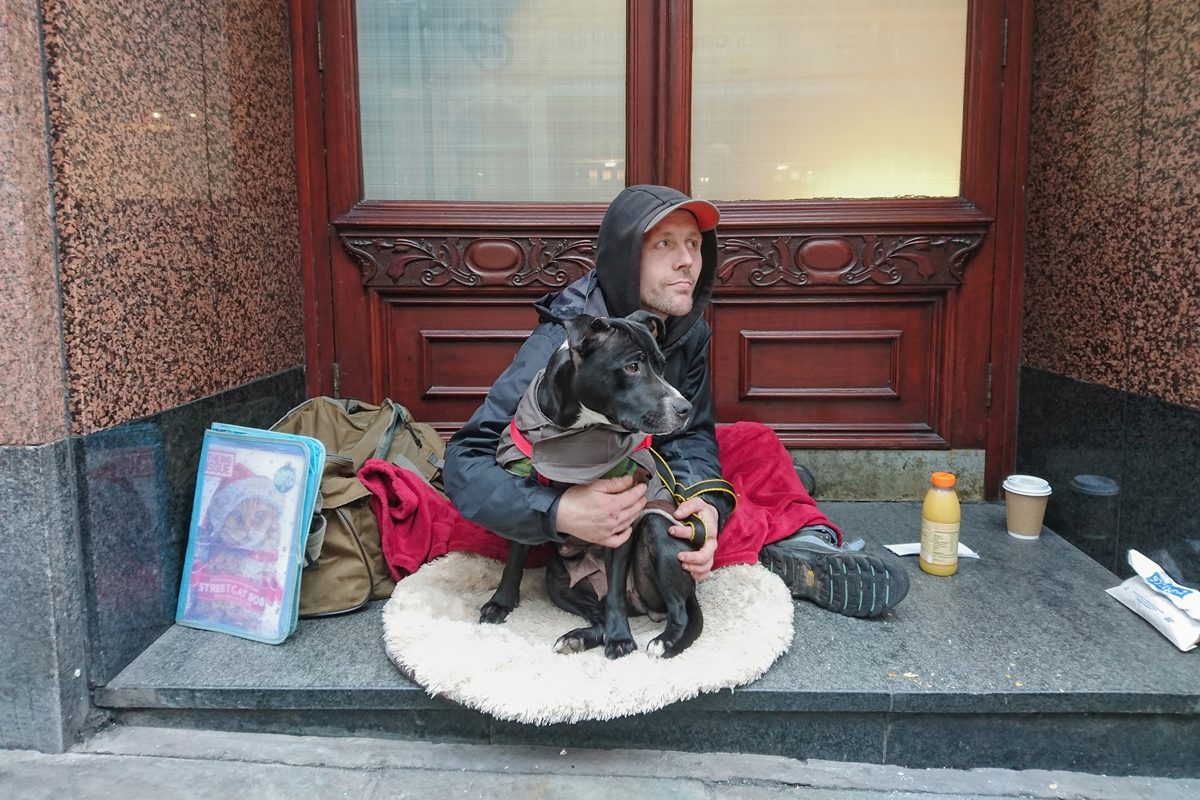Victims of the gig economy … and the regular economy
Much has been made of the gig economy, both at home in the UK and abroad.
The Guardian reports that it’s doubled in size, now employing – or rather, contracting – more than 4.7 million workers.
At least some of them are homeless, as a recent Twitter post from Ireland’s Councillor Lawrence Hemmings exposes.

Unfortunately, these jobs and others like them are more focused on quantity than quality, quite literally leaving their workers out on the streets.
Though this particular incident took place in Dublin, it could just have easily been anywhere in the UK, the US, Canada, and beyond.
Are The ‘New Working Homeless’ Really That New?
Councillor Hemmings’ tweet references the “new working homeless,” but is the phenomenon really anything new? Or is this just the first time a single snap has been able to sum up the problem so succinctly?
Unfortunately, it’s likely the latter.
In England, more than half of all homeless families are in work, but the pay from their jobs doesn’t allow them to afford sky-high rents, and social housing is too often unavailable.
This may shock those who have long thought of a job as a one-way ticket out of homelessness. But it’s a fact all too familiar to the 25% of people at risk for homelessness who have paid employment.
And 25% is a conservative estimate. In certain councils like Rutland in the East Midlands, that number can rise up to 50%. Predictably, the numbers are lower in the northeast, where housing is cheaper.
The false mutual exclusivity of employment and homelessness is all too vivid for these working households teetering on the edge of homelessness.
What Is Causing In Work Families to Fall Into Homelessness?
The cause of working homelessness is two-fold: first, there is the rising cost of housing that can be a financial burden to even the most gainfully employed among us.
Then, there is the matter of gainful employment. It’s becoming a lot rarer, with jobs offering the bare minimum compensation and leaving workers to make up the difference with second jobs, third jobs, and any other form of supplemental income that they can come across.
There is also the issue of ongoing government austerity measures that have substantially weakened the public safety net. The amount of social housing currently available is simply not able to meet the demand of those who need it, and new projects are being built at an alarmingly slow pace.
Now, what would have once been a temporary setback can morph into years or even a lifetime of homelessness.
How Do Working People Become Homeless?
It starts off simply enough. Maybe you’ve fallen behind on rent a few times. Or maybe your landlord just wants to take advantage of the high property prices and raises it unexpectedly. If you can’t pay the new price, surely someone else can, so you and your family are evicted.
You look around for alternative housing, but there’s nothing even remotely within your budget. That’s when you start to panic.
You may try to stay with friends or family, or book a little time in a hotel. Eventually you’ll have to face the facts. You’re without a home, with little hope of being able to afford another one on your salary any time soon. You get on a waiting list for social housing with no idea when that will come through. It could be years.
The Vicious Cycle of the Working Homeless
While you may have had a job when you fell into homelessness, the demands of the lifestyle can often cause you to lose it before your ordeal is over.
Simple things like keeping clothes neat and pressed, seeing to your hygiene each morning, and arriving on time each morning can become a lot more challenging when you’re homeless or sleeping rough.
At times, your efforts to escape homelessness may also clash with your efforts to keep your job. For example, if you need to attend a meeting at your local council’s housing department during your scheduled shift hours. They’ll do their best to work with you on that, but schedules can be unpredictable and it can’t always be avoided. In that sort of situation, you essentially need to choose between risking a job and risking staying in homelessness longer.
Not an easy choice.
There are a million little things in the life of a homeless person that make it more and more difficult to hold down a steady job or be hired on to a new one. Periods of unemployment only make it harder to get back into permanent housing. That’s the vicious cycle that working homeless people face every day.
Putting An End to Working Homelessness
Working homeless people will likely be the first to benefit from measures designed to end general homelessness. Since they do have a bit of income, they’ll be able to capitalize on things like more affordable housing more readily than their peers without employment. Therefore, ending working homelessness and ending homelessness more generally are two goals that are heavily intertwined. To accomplish these goals, we need to:
- Commit to building much more social housing and making it available to those who need it.
- Increase the housing benefit as soon as possible so that low-income people can access the private rental market in the meantime.
There are also certain things that will help the UK’s working homeless people uniquely:
- Institute a pay rise to £10 per hour as soon as possible.
- Increase job security
- Ban zero-hour contracts wherein employers are not obliged to provide employees with any minimum amount of hours whatsoever. These contracts are exploitative to workers, monopolizing their time by making them remain available at all hours “just in case” they’re called in, but guaranteeing nothing in return.
Homelessness has no place in the UK, and homelessness of working people even less so. Low paying, insecure jobs and unaffordable rents, along with cuts in housing benefit have left us with an unfolding disaster on our hands. We must act quickly to prevent it.













